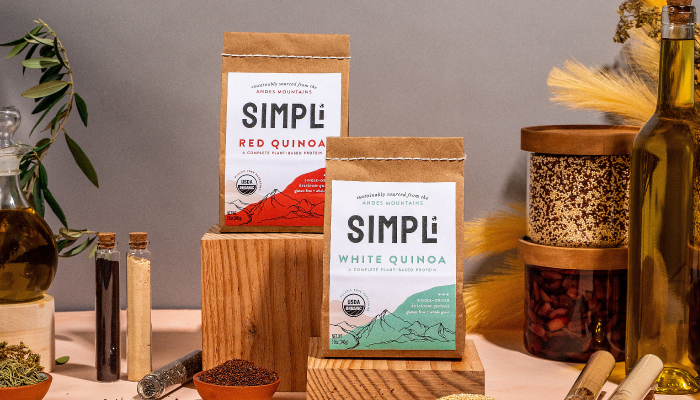SIMPLi Takes Local Sourcing Global Through Ingredient Platform

In a flip on the classic saying, ingredients maker SIMPLi is thinking locally and acting globally. The Baltimore-based company, backed by new funding, is aiming to sustainably and ethically streamline supply chains for grains, beans, oils and spices to ultimately benefit farmers, consumers and the environment.
SIMPLi, launched last year, was co-founded by Matt Cohen and Sarela Herrada, a former director of food and beverage for fast casual restaurant chain CAVA. During her time there, Herrada said she first “started to really listen to the customer” about their desire to know where their food came from and saw white space to expand that internationally.
“We saw in the States how the customer and the consumers want to know more about where food comes from and want to support our local farmers and our local economy. But how do we do that for items that just don’t grow locally?” Herrada said. “We saw that space to really build SIMPLi on an international global scale with international farming communities.”
Its wholesale ingredient offerings include white, red, black and tricolor quinoa and chia seeds sourced from Peru (where Herrada was born and raised) along with three olive oil varieties and kalamata olives from Greece and sunflower oil from Ukraine. The company is also continuing to grow its offerings, recently launching artichokes from Peru, with acai from Brazil set to debut next month.
With its ingredients, SIMPLi aims to combat fraudulent international supply chains and poverty and inequality in international communities while promoting sustainable growing practices and sourcing. SIMPLi shortens the multi-step international supply chain by bringing ingredients directly from farmers to businesses, removing the need for third parties like local broker co-ops, processors, exporters and importers, U.S. brokers and distributors while also eliminating any possible fraudulent activity that could happen between these steps, such as misbranding or misrepresenting products or using unspecified enhancements or additives. Cohen said the company supports farmers by paying above market prices and offering a stable demand.
Reducing the environmental impact of its ingredients is also paramount, Cohen said, and SIMPLi helps farmers transition from conventional to organic and regenerative farming, in addition to donating of equipment. Herrada said the company chose to launch quinoa, for example, due to its ability to be grown through regenerative agricultural practices and rotated with lupini beans, another crop it plans to bring to market soon.
“I think that’s something that’s very sensitive, and people are seeing firsthand around the world — there’s forest fires, there’s an increase in hurricanes, things that people are seeing firsthand in their backyard,” he said. “I think you’re starting to notice that there’s a lot more conscious buyers, because they can actually make an impact by supporting companies that do certain practices that improve the world.”
Since its launch last year, the company has partnered with companies like Daily Harvest, sweetgreen, &pizza and plant-based meal delivery service Splendid Spoon. While its main focus is B2B, SIMPLi also operates a CPG business, finding it important that consumers “feel empowered” to make ethical and sustainable choices both when eating out and cooking from home, Herrada said. Last month, it launched red, white and tri-colored quinoa at 49 Whole Foods locations across Pennsylvania, Maryland, Ohio, Kentucky, New Jersey, Virginia and Washington, D.C. These products are also sold at over 100 retailers across the Mid-Atlantic region as well as on ecommerce platforms such as Patagonia Provisions. The quinoa varieties, along with its Greek Extra Virgin Olive Oil and Greek Extra Virgin Olive Oil & Ukrainian Sunflower Oil Blend, are also sold direct-to-consumer on the company’s website.
SIMPLi has also garnered investment support as it looks to meet its goals. Last month, the company announced it had closed a seed funding round for an undisclosed amount, led by the Abell Foundation, which invests in brands promoting social objectives in the Baltimore City area. Additional funding came from investors such as Honest Tea and Eat The Change co-founder Seth Goldman, who said he was impressed by the company’s goal to “set the highest standard when it comes to food and supply chain integrity.”
Cohen said the company is using the funding to expand its team, with a focus on growing its sales and operations. SIMPLi currently has 10 U.S. employees with an additional 10 based in South America and Europe. It’ll also invest in technology opportunities, Cohen said, to create a “seamless experience” for its B2B customers to trace ingredients’ journey from the farms.
Marketing efforts will also be a priority for SIMPLi, with an emphasis on storytelling that its brand partners can then leverage to share with their consumers. Beyond just the logistical sourcing of its products, sharing and respecting the history of crops is also important to the company, Herrada noted. Communicating the importance of the crop’s history — a food staple that’s been around for thousands of years, originating from the Inca Empire in the Andean part of South America — and its impact on the farming community in Peru has also been a key area of focus.
“If those stories are not told through the SIMPLi lens, then the story really is not completely told,” she said. “The story of the farmers behind the scenes and how they can potentially benefit from growing these items for the export market is a story that needs to be told.”















